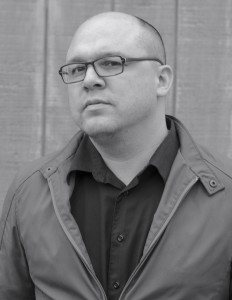FPP spoke with poet Matthew Olzmann via email about writing poems when Nazis are marching in the streets, what it’s like when people choose which “facts” they’re going to believe, and much more. Come out to Shrine on Tuesday, November 7th when he joins Ibrahim Abdul-Matin, Yarimar Bonilla, Keesha Gaskins-Nathan, Max S. Gordon, PJ Marshall, Suzanne Russell and Carla Shedd for One Year Later: Writers, Artists, & Advocates Respond to Our American Crisis.
 Has the current political moment affected your art or work life? If yes, how so? It’s added an additional level of self-consciousness to the process. How do you write poems when there are Nazis marching in the streets?
Has the current political moment affected your art or work life? If yes, how so? It’s added an additional level of self-consciousness to the process. How do you write poems when there are Nazis marching in the streets?
What didn’t you see coming? People have been divided on a number of issues for a long time. But we’re no longer debating those issues; we’re debating and arguing about the nature of reality. People are choosing which “facts” they’re going to believe, then proceeding as if their beliefs are now reality. There’s no such thing as evidence. Science is a myth. There were a billion people at the inauguration. These hurricanes aren’t real. The news is fake. The sky is a liberal conspiracy.
When do you feel most “we” and when do you feel most “I”? Initially, I saw this as a “craft of writing question” as point of view is one of the first choices a writer has to make when writing almost anything. Each point of view offers the writer a set of opportunities, and each has its own disadvantages and challenges. The first person plural’s “we” is often, for me, the most challenging. It’s the voice of the collective. Using the “I” is easy. One can say “I believe in God” or “I don’t believe in God” and either claim might seem legitimate. However, the same statement begins to feel exclusionary or oppressive once it’s applied to a collective. If “I believe” becomes “we believe,” additional questions come up. Who is “we”? Who is included and who is excluded? It’s difficult to use the word “we” in a broad or general fashion. With that in mind, I feel like an “I” all of the time. I feel most like a “we” when the community it includes is very specific.
Is there a person, or a community, or artwork, or anything at all that has inspired you these past days? Oddly, while the current moment has made me more self-conscious about my own writing, and probably pushed it, at times, in a more overtly political direction, it’s done little to change what I’m drawn to as a reader. All the art and poetry that has inspired me in the past continues to do so. In recent days, I’ve been reading or rereading a handful of poems by Szymborska, Hayden, Pat Rosal, Jamaal May, Jessica Jacobs, David Tomas Martinez, Jennifer Chang, Stephen Dobyns, Rilke, Cathy Linh Che, Frank O’Hara, Gabrielle Calvocoressi and C. Dale Young. The poems I loved a year ago, or many years ago, are still the poems I love now. They make me feel more engaged with the world, more connected to humanity, and remind me of both its terror and wonder.
